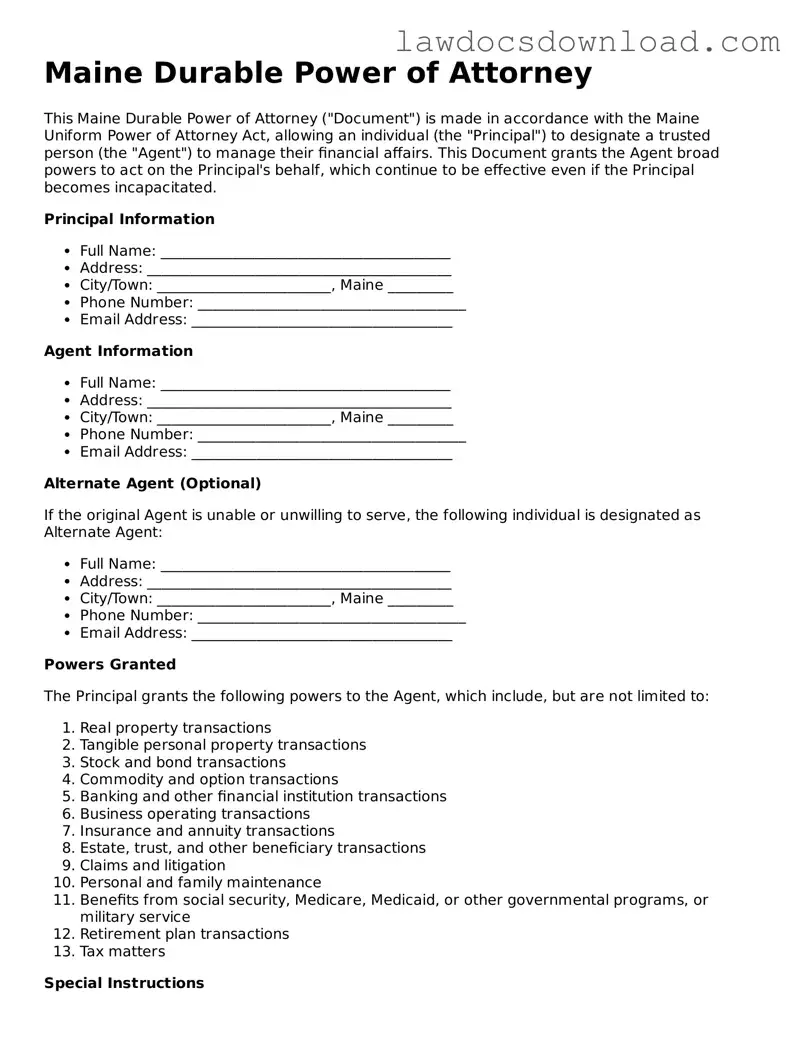Maine Durable Power of Attorney
This Maine Durable Power of Attorney ("Document") is made in accordance with the Maine Uniform Power of Attorney Act, allowing an individual (the "Principal") to designate a trusted person (the "Agent") to manage their financial affairs. This Document grants the Agent broad powers to act on the Principal's behalf, which continue to be effective even if the Principal becomes incapacitated.
Principal Information
- Full Name: ________________________________________
- Address: __________________________________________
- City/Town: ________________________, Maine _________
- Phone Number: _____________________________________
- Email Address: ____________________________________
Agent Information
- Full Name: ________________________________________
- Address: __________________________________________
- City/Town: ________________________, Maine _________
- Phone Number: _____________________________________
- Email Address: ____________________________________
Alternate Agent (Optional)
If the original Agent is unable or unwilling to serve, the following individual is designated as Alternate Agent:
- Full Name: ________________________________________
- Address: __________________________________________
- City/Town: ________________________, Maine _________
- Phone Number: _____________________________________
- Email Address: ____________________________________
Powers Granted
The Principal grants the following powers to the Agent, which include, but are not limited to:
- Real property transactions
- Tangible personal property transactions
- Stock and bond transactions
- Commodity and option transactions
- Banking and other financial institution transactions
- Business operating transactions
- Insurance and annuity transactions
- Estate, trust, and other beneficiary transactions
- Claims and litigation
- Personal and family maintenance
- Benefits from social security, Medicare, Medicaid, or other governmental programs, or military service
- Retirement plan transactions
- Tax matters
Special Instructions
If the Principal wishes to limit any powers granted to the Agent or provide specific instructions, they may do so here:
____________________________________________________________________________________________________
____________________________________________________________________________________________________
____________________________________________________________________________________________________
Effective Date and Duration
This Document is effective immediately upon execution and remains in effect indefinitely unless the Principal revokes it or specifies a termination date herein: _______________.
Signature of Principal
By signing below, the Principal acknowledges they have read and understood the contents of this Document and voluntarily appoint the above-named Agent to act on their behalf.
Date: ___________________________
Signature: _________________________
Signature of Agent
By signing below, the Agent acknowledges they have read and accepted the appointment to act on behalf of the Principal with the powers outlined in this Document.
Date: ___________________________
Signature: _________________________
Signature of Alternate Agent (if applicable)
By signing below, the Alternate Agent acknowledges they have read and accepted the appointment to act on behalf of the Principal with the powers outlined in this Document, in the event the original Agent is unable or unwilling to serve.
Date: ___________________________
Signature: _________________________
Witness Acknowledgment
This Document was signed in the presence of witnesses, who by signing below, attest that the Principal appeared to understand the nature of this Document and was free from duress or undue influence at the time of signing.
Witness #1
Date: ___________________________
Signature: _________________________
Printed Name: ______________________
Witness #2
Date: ___________________________
Signature: _________________________
Printed Name: ______________________
Notary Public Acknowledgment
This Document was acknowledged before me on this date by _______________ (the Principal), who is personally known to me or has produced identification. The Principal appeared to be of sound mind and not under duress, threat, or undue influence at the time of signing.
Date: ___________________________
Notary Signature: __________________
Commission expires: ________________

